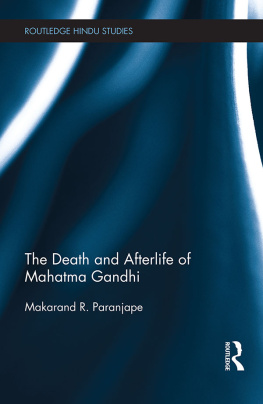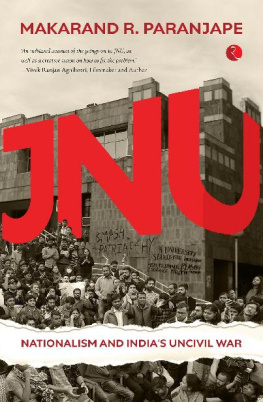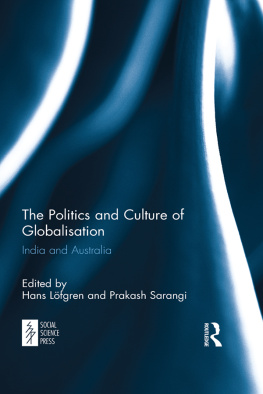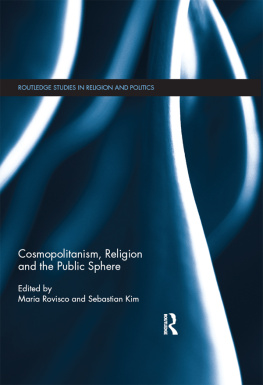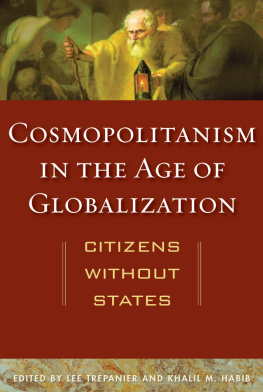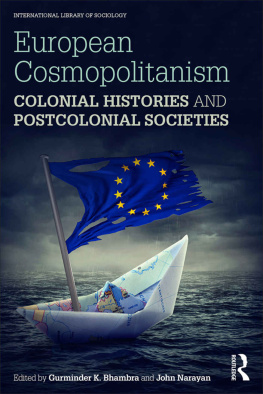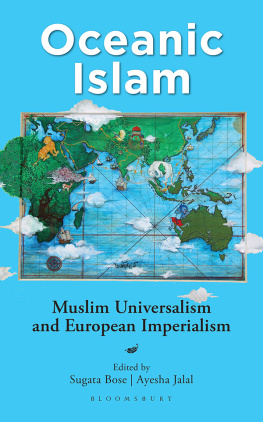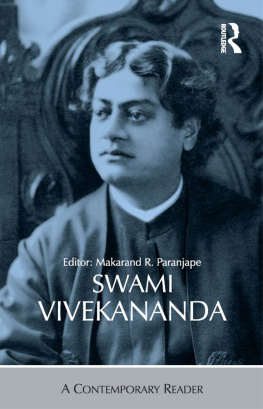
Cultural Politics in Modern India
Indias global proximities derive, in good measure, from its struggle against British imperialism. In its efforts to become a nation, India turned modern in its own unusual way. At the heart of this metamorphosis was a colourful cosmopolitanism, the unique manner in which India made the world its neighbourhood. The most creative thinkers and leaders of that period reimagined diverse horizons. They collaborated not only in widespread anti-colonial struggles but also in articulating the vision of alter-globalization, universalism, and cosmopolitanism. This book, in revealing such a dimension, offers new and original interpretations of figures such as Kant, Tagore, Heidegger, Gandhi, Aurobindo, Gebser, Kosambi, Narayan, Ezekiel, and Spivak. It also analyzes cultural and aesthetic phenomena, from the rasa theory to Bollywood cinema, explaining how Indian ideas, texts, and cultural expressions interacted with a wider world and contributed to the making of modern India.
Makarand R. Paranjape is Professor of English at the Centre for English Studies, School of Language, Literature and Culture Studies, Jawaharlal Nehru University, New Delhi. He was the inaugural Eric Auerbach Visiting Chair in Global Literary Studies at the University of Tbingen, Germany, and served as the first ICCR Chair in Indian Studies at the National University of Singapore. His latest works includes The Death and Afterlife of Mahatma Gandhi (2014) and Swami Vivekananda: A Contemporary Reader (2015).
Paranjape is among the leading humanist intellectuals of his generation in India. In this volume he clarifies the circulations and crossings between Indian and global cultures in all their novelties and quandaries that every thinking Indian should reflect upon.
Prasenjit Duara ,
Director, Asia Research Institute, Singapore
An exemplary performance of cultural theory from the South. Engaging with significant figures from Indias history of thought, Paranjape recalibrates cultural theory by allowing its central questions to be posed in terms set by its own intellectual actors. He never fails, nonetheless, to engage with an array of interlocutors from around the world, making his book a work of truly global scope.
Russell West-Pavlov ,
Professor of English, University of Tbingen, Germany
Paranjape explores alter-cosmopolitanisms with rare skill and sensitivity. The book integrates habitual binaries of western paradigms, and enshrines what may be called scriptural modernities.
Sachidananda Mohanty ,
Vice-Chancellor, Central University of Odisha, India
First published 2016
by Routledge
2 Park Square, Milton Park, Abingdon, Oxon OX14 4RN
and by Routledge
711 Third Avenue, New York, NY 10017
Routledge is an imprint of the Taylor & Francis Group, an informa business
2016 Makarand R. Paranjape
The right of Makarand R. Paranjape to be identified as author of this work has been asserted by him in accordance with sections 77 and 78 of the Copyright, Designs and Patents Act 1988.
All rights reserved. No part of this book may be reprinted or reproduced or utilised in any form or by any electronic, mechanical, or other means, now known or hereafter invented, including photocopying and recording, or in any information storage or retrieval system, without permission in writing from the publishers.
Trademark notice: Product or corporate names may be trademarks or registered trademarks, and are used only for identification and explanation without intent to infringe.
British Library Cataloguing in Publication Data
A catalogue record for this book is available from the British Library
Library of Congress Cataloging-in-Publication Data
A catalog record has been requested for this book
ISBN: 978-1-138-95692-6 (hbk)
ISBN: 978-1-315-66545-0 (ebk)
Typeset in Goudy
by Apex CoVantage LLC, Herndon, Virginia
TO RAMESH AND PRAMILA SARVA, FOR THREE DECADES OF AFFECTION AND UNDERSTANDING
Contents
Every book is a journey. This one began many years ago, when I was a graduate student at the University of Illinois at Urbana-Champaign, USA. I worked on Mysticism in Indian English Poetry for my PhD. My supervisor, R. Baird Shuman, a specialist in modern American drama, was also the Director of Freshman Composition. After registering for his Pro-seminar in Teaching Rhetoric, I took on one of the twenty-five or thirty sections of Rhet 105, the basic, mandatory writing course. My class comprised of mostly engineering students, who formed the staple crop of undergraduates at this large mid-Western state school. I am deeply grateful to Bob, who trained me to teach this course, in turn forcing me to learn not just how to write but also how to think.
Bob became my dissertation supervisor too. But because he was not familiar with my field, I worked closely with Girdhari Lal Tikku, a Professor of Comparative Literature, not only well-versed in mystical literature but a spiritual practitioner too. What I grasped from Giri is that spirit includes both matter and mind; it is not something apart. Spirit permeates social and political concerns without being reducible to either. I have taken such a long time to understand just how important this fact is. It calls for nothing short of shifting the centre of ones consciousness, after which one no longer does academics as most professional scholars might. On the other hand, it is also true that experiencing the spirit in our daily work does not imply a suspension of reason or of academic rigour. Without the latter, we end up floundering in a maze of confused thinking and category errors. Not just faith or devotion, but a highly developed and trained mental faculty is vital to spiritual development. Else, we are liable to become victims and perpetrators of outlandish and irrational beliefs. My teachers, Bob and Giri, are both long gone. Though I miss them, I feel their continued presence and influence.
Two teachers I would so have liked but lost the opportunity to work with are the late Professor Edward Said and Professor Gayatri Chakravotry Spivak. I was admitted to an M.A. in English and Comparative Literature in Columbia for the fall 1980 session but without funding. Instead, I went to the University of Illinois with full financial support. Bob, who was on the Graduate Studies Committee, identified me as someone worth admitting; he was the primary reason for my joining. Later, it was Giri Tikku who asked me to read Orientalism in the early 1980s, before it came to be recognized as a foundational text of a new discipline. Winds of change were blowing across the conservative mid-West. While many were bewildered with Saids critique of Orientalism , I, as a colonial subject, instantly understood the drift of his book. The nexus of knowledge and power was unmistakeable; the whole history of colonial India, as also my own subject formation, made this obvious and palpable to me. I met Professor Said only several years later. Though I did not study with him, his work has continued to inspire me.
My brush with Professor Spivak was a little more tangible, though equally fleeting. During my years at Illinois, she made a spectacular impact in the July 1983 conference on Marxism and the Interpretation of Culture. The paper she delivered, Can the Subaltern Speak, published in the conference proceedings, subsequently went on to be one of the most celebrated and cited texts in postcolonial criticism. Now there is an entire book devoted to it and its outcomes. Professor Spivak was then a frequent visitor to my university as a part of the summer institutes of the Unit for Criticism and Interpretive Theory. The Unit itself was started in 1981, not too long after I joined the Department of English as a graduate student. When I was drawing up the list of texts for my Special Field examination, some members of the faculty suggested that I consult Professor Spivak. I was then steeped in the mystics; I did not realize that critical theory, albeit in different ways, was also bending the post-Enlightenment mind of Europe and North America towards something beyond instrumental rationality. Somehow, the connection could not be made. It took me another two decades to come to grips with Professor Spivaks extraordinary oeuvre. To her work I offer my own kind of belated and possibly backhanded homage in the Introduction to this volume.


